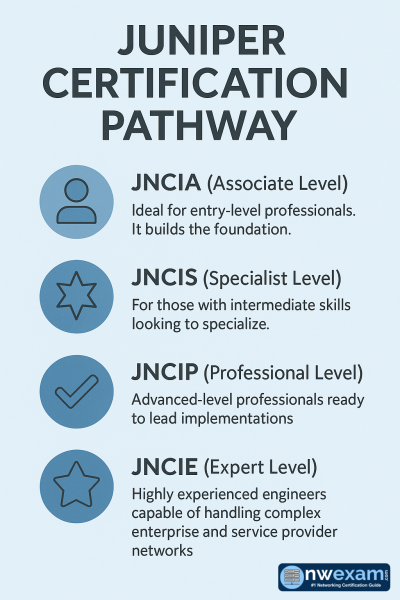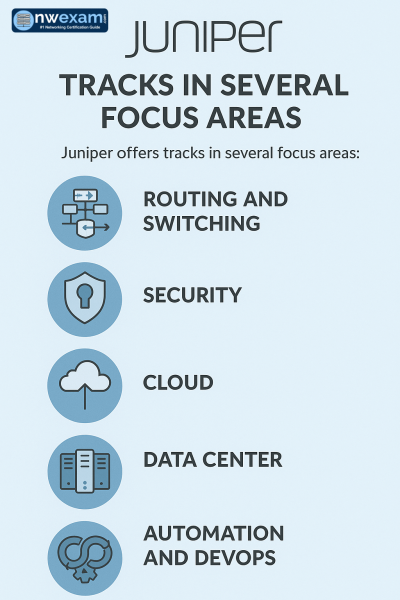Stepping Into a Future-Ready IT Career with Juniper Certification
There’s a reason top enterprises rely on Juniper Networks. Known for powering high-performance networks across the globe, Juniper has established itself as a trusted name in the IT infrastructure space. From cloud solutions to AI-driven networking and security, Juniper’s footprint is massive—and it’s only growing.
As companies increasingly adopt Juniper technologies, the demand for professionals with verified Juniper skills has skyrocketed. And that’s where Juniper Certification comes into play. Whether you’re a beginner or a seasoned professional, these certifications validate your expertise, position you for growth, and open doors to higher salaries and more specialized roles.
In this guide, we’ll explore the real value of becoming Juniper-certified—from mastering core technologies to landing high-paying networking jobs. Let's break down everything from certification levels and career advantages to ROI and practical tips.
Juniper Certification Pathways That Make a Difference
Juniper Certifications are structured, role-based credentials that assess your hands-on ability to deploy, configure, and troubleshoot Juniper network technologies.

Here’s a quick breakdown of the certification tiers:
-
JNCIA (Associate Level) – Ideal for entry-level professionals. It builds the foundation.
-
JNCIS (Specialist Level) – For those with intermediate skills looking to specialize.
-
JNCIP (Professional Level) – Advanced-level professionals ready to lead implementations.
-
JNCIE (Expert Level) – Highly experienced engineers capable of handling complex enterprise and service provider networks.
Juniper offers tracks in several focus areas:

Each track equips professionals with real-world, vendor-specific knowledge critical in Juniper-powered environments.
Explore the official certification paths here.
Why Juniper-Certified Talent Is in High Demand
Employers are actively seeking juniper certified professionals. Here’s why:
-
Verified Skillset: Certification confirms you have hands-on experience with Juniper equipment, from firewalls to routers and automation tools.
-
Reduced Onboarding Costs: Trained professionals require less training, which saves time and money for companies.
-
Business Readiness: Certified individuals can manage, secure, and scale networks confidently—even in high-pressure scenarios.
-
Technology Confidence: With validated skills, you're more likely to lead projects and resolve critical issues without external dependencies.
Whether in service provider setups, government organizations, or data-driven enterprises, hiring certified engineers is seen as a smart business decision.
From Proficiency to Promotion: What’s in It for You?
Obtaining a Juniper certification is more than just a credential—it’s a gateway to a world of exciting career opportunities, enhanced job satisfaction, and a roadmap to greater professional growth. Whether you're just starting out or you’re already a seasoned professional, Juniper certifications can catapult your career to new heights. Here's how:
1. Mastering Cutting-Edge Technologies: A Real-World Skill Set
Juniper certifications equip you with hands-on expertise in some of the most innovative and in-demand technologies in networking today. Whether it’s implementing next-gen security protocols, deploying scalable routing and switching solutions, or mastering automation tools for network management, you’ll gain skills that directly impact your day-to-day job.
When you become Juniper certified, you’re not just memorizing concepts; you’re gaining a real-world toolkit that helps you solve complex networking challenges with confidence. For instance:
-
Routing & Switching: Master protocols like BGP and OSPF, essential for maintaining large-scale enterprise networks.
-
Network Security: Implement cutting-edge Juniper firewalls and security solutions to protect your organization’s sensitive data.
-
Cloud Networking: Understand cloud integration and its role in modern, hybrid infrastructures—a must-have for today's cloud-first enterprises.
These practical skills are not only relevant but crucial for staying competitive in the rapidly evolving IT industry.
2. Higher Earning Potential: Invest in Your Future
It’s no secret—certified professionals earn more than their non-certified counterparts. The investment you make in getting certified today can pay huge dividends in the future. Here’s why:
-
Competitive Edge: Employers recognize the value of Juniper-certified professionals. Your credentials make you a highly desirable candidate for roles that require specific expertise.
-
Promotion Opportunities: Certifications provide a clear career progression. They show your commitment to professional development and your readiness to take on more responsibility. Whether it’s moving from a junior to senior network engineer role, stepping into a managerial position, or transitioning into a consulting role, Juniper certifications pave the way for advancement.
-
Salary Growth: As a certified professional, you become eligible for higher-paying roles. For example, a Juniper-certified network engineer can command a salary that’s 10-15% higher than non-certified peers, and even more if you advance to the JNCIP or JNCIE level.
This career ROI isn't just a one-time boost. It’s a long-term benefit that compounds over the years.
3. Unlocking New Career Paths and Roles
The beauty of Juniper certifications is their versatility. These certifications don’t just make you an expert in a specific technology—they open doors to a wide array of roles and industries. With Juniper expertise, you can step into:
-
Cloud Architect: Use your cloud networking knowledge to design flexible, scalable architectures for organizations moving to the cloud.
-
Cybersecurity Specialist: Juniper’s security certifications will help you design robust security infrastructures that protect businesses from emerging threats.
-
Network Consultant: Help businesses optimize and scale their network systems. With a Juniper certification, you’ll gain the credibility needed to consult on critical projects.
-
Pre-Sales Engineer: Use your in-depth knowledge of Juniper products to support sales teams by helping clients understand the technical advantages of Juniper solutions.
Your certification can be your ticket to breaking into specialized fields, or pivoting into roles that align more closely with your evolving career interests.
4. Confidence in Problem-Solving & Leadership
Certified professionals are often expected to take on leadership roles, not just technical tasks. With Juniper certifications, you're not only equipped with technical skills, but you also develop the confidence to take charge in critical situations:
-
Troubleshooting with Expertise: You’ll be the go-to expert when network issues arise, able to resolve problems quickly and efficiently.
-
Leading Projects: Juniper-certified professionals are often tasked with overseeing large-scale deployments, whether implementing new security measures, upgrading network infrastructure, or migrating systems to the cloud.
-
Mentoring Others: As you climb the career ladder, your ability to mentor and lead junior colleagues becomes increasingly valuable. With certification under your belt, you can guide others in their professional development, contributing to team growth and overall success.
Your confidence will not only help you in your current role but also position you as a key player in future projects, giving you the credibility to lead teams and collaborate with senior leadership.
5. Access to a Global Community & Industry Recognition
When you become Juniper certified, you gain access to a prestigious global network of professionals. This community can provide:
-
Peer Support: Whether you're troubleshooting a problem, exploring new Juniper features, or simply seeking advice, your certified peers are a valuable resource.
-
Industry Recognition: Juniper’s certifications are recognized across the IT industry. When you list a Juniper certification on your resume, it’s a powerful signal to employers that you have the skills they need to stay ahead of the competition.
-
Exclusive Resources: Juniper-certified professionals gain access to exclusive resources, including product updates, training webinars, and advanced networking tools. These perks ensure you stay current in the fast-moving field of networking.
Where Juniper Certification Makes an Impact: Transforming Your Career
In a world where technology is evolving rapidly, Juniper certifications make a lasting impact by equipping professionals with the knowledge, skills, and confidence to thrive in highly competitive and dynamic job markets. From job security to leadership roles, Juniper certifications unlock incredible opportunities across various industries, enabling you to not just keep up with technological advancements but to lead the charge. Here’s a closer look at where Juniper certifications make the biggest impact:
1. Real-World Applications in Networking
The most significant impact of Juniper certifications is their ability to provide real-world expertise. Employers are increasingly seeking professionals who can tackle complex networking challenges, and Juniper-certified individuals stand out because they can offer practical, vendor-specific solutions to problems.
For example, after achieving a JNCIA-Junos certification, a network engineer will be proficient in configuring routers, switches, and other networking devices in real-time scenarios. This hands-on skill is invaluable, particularly when troubleshooting live networks, optimizing performance, or implementing new technologies.
Certified professionals aren’t just passing exams—they are mastering the tools and techniques that drive actual business outcomes. Whether you’re involved in network automation, cloud integration, or data center operations, the ability to apply your knowledge directly to organizational needs sets you apart from non-certified professionals.
2. High Demand Across Various Industries
From telecommunications to cloud computing and cybersecurity, Juniper certifications cater to an expansive array of industries. Juniper Networks’ technologies power infrastructures across large-scale enterprises, service providers, and global data centers, creating demand for professionals who can design, implement, and maintain these networks.
Some of the key industries where Juniper-certified professionals are in high demand include:
-
Telecommunications: With the growing shift toward 5G and IoT, network engineers with Juniper certification play a crucial role in building and maintaining telecom networks.
-
Cloud Computing: As businesses increasingly migrate to cloud environments, Juniper-certified cloud engineers ensure that cloud-based networks are efficient, secure, and scalable.
-
Cybersecurity: In a world of ever-growing cyber threats, Juniper security specialists are needed to safeguard enterprise networks with robust firewall protection and threat detection systems.
-
Data Centers: As data centers continue to expand and evolve, Juniper-certified data center professionals are in demand to implement and manage high-performance, reliable network infrastructures.
Having a Juniper certification opens the door to these industries, where you’ll find exciting and varied opportunities, as well as job stability and growth.
3. Bridging the Gap Between Theory and Practice
The real-world impact of Juniper certifications also lies in the way they bridge the gap between theoretical knowledge and practical application. While traditional academic qualifications provide a strong foundation, certifications like Juniper ensure that professionals have hands-on experience with the tools and technologies that drive success in today’s fast-paced work environments.
Unlike academic degrees that may cover broader topics, Juniper certification programs focus on specific skills and tools that are directly relevant to the job at hand. This practical training enhances your ability to address issues, implement solutions, and contribute meaningfully to team efforts in a way that is both efficient and cost-effective.
For instance, Juniper’s JNCIP (Juniper Networks Certified Internet Professional) prepares you to handle large-scale networks with greater efficiency, reducing downtime and improving system performance. These skills are in demand by employers who need professionals who can deliver fast, reliable solutions in mission-critical environments.
4. Climbing the Career Ladder
Juniper certifications act as a catalyst for career progression. They provide clear milestones for professional development and offer pathways from entry-level positions to high-level leadership roles. Here’s how they make a significant impact at different career stages:
-
Entry-Level: If you're just starting out in networking, earning a JNCIA-Junos certification can be your ticket to securing a foundational role as a network engineer or IT technician. At this stage, it helps you develop a deep understanding of core networking concepts and Juniper-specific technologies that can be applied in real-time environments.
-
Mid-Level: As you gain more experience, certifications like the JNCIS (Juniper Networks Certified Internet Specialist) or JNCIP (Juniper Networks Certified Internet Professional) can help you transition to more specialized roles such as network architect or cloud infrastructure engineer. These certifications highlight your expertise in advanced networking concepts and demonstrate your capability to handle more complex, high-impact projects.
-
Advanced-Level: For seasoned professionals, the JNCIE (Juniper Networks Certified Internet Expert) certification is the pinnacle of achievement. With this certification, you’ll be recognized as an expert in Juniper technologies, eligible for top-tier roles like network consultant, solutions architect, or even executive positions such as CTO or chief architect. These roles require not only technical proficiency but also the ability to lead teams and shape the strategic direction of technology in an organization.
5. Expanding Your Professional Network
One of the often overlooked yet impactful benefits of being Juniper certified is the opportunity to network with other certified professionals. By joining Juniper’s extensive network of industry experts, you gain access to:
-
Peer Connections: Engage with other professionals, share insights, and learn from their experiences. This network can help you stay informed about the latest trends and best practices in the industry.
-
Industry Events: As a Juniper-certified professional, you can attend exclusive Juniper events such as networking summits, workshops, and seminars. These events provide the perfect opportunity to expand your industry knowledge and make valuable professional connections.
-
Collaborative Opportunities: Certification also often leads to opportunities for collaboration on large-scale projects, where you can work alongside other top professionals, further enhancing your career.
This professional network not only aids in your development but also keeps you connected to exciting new opportunities in the field.
6. Building Trust and Credibility
Finally, Juniper certification brings with it a level of credibility that helps you earn the trust of both employers and clients. As businesses continue to rely on complex network infrastructures, they need professionals who are not only technically skilled but who can also prove their proficiency through recognized certifications.
Being Juniper certified reassures employers and clients that you have the knowledge, practical skills, and industry-recognized expertise to design, implement, and maintain high-performance network systems. This trust is invaluable in competitive industries where clients demand the best and employers seek professionals who can deliver results with confidence.
Beyond Juniper Exams: What More Do You Get?
Juniper credentials bring more than just a badge on your resume:
-
Increased Confidence: You’ll be more sure of your capabilities, whether in job interviews or troubleshooting outages.
-
Stronger Industry Credibility: Clients and colleagues trust certified professionals to handle critical tasks.
-
Access to Opportunities: Many partner programs and client contracts require certified engineers.
-
Structured Learning: The curriculum gives you direction, reducing guesswork in your learning path.
What’s the ROI of Juniper Certifications?
-
Juniper Certification Cost: Most associate-level exams cost $200 USD, with higher-level certifications ranging from $300 to $400 USD.
-
Career Return: Certified professionals report significant increases in job offers, confidence, and compensation.
A few hundred dollars today can potentially lead to thousands in salary growth and lifelong career advancement.
The Juniper certification journey is not just about the cost; it’s about the long-term Juniper certification value you build.
Juniper Certification That Delivers Real Value
The impact of Juniper certifications extends far beyond just passing an exam. They transform professionals into capable, trusted, and highly sought-after experts. From practical, real-world skills to career advancement and industry recognition, Juniper certifications make a significant difference in your professional life.
Whether you’re stepping into the IT world for the first time or looking to take your career to the next level, Juniper certifications offer the tools, resources, and opportunities to help you thrive. So, invest in your future, enhance your skills, and let your Juniper certification be the catalyst for the success you deserve.
Plan Your Juniper Certification Path with Confidence
Starting with JNCIA-Junos is often the best choice. It lays the groundwork for your Juniper career journey.
Here’s how to prepare smartly:
-
Use official study guides from Juniper.
-
Take online practice exams on nwexam to assess your readiness.
-
Set up a home lab or use virtual labs.
-
Join Juniper forums and communities for peer support.
Each step you take builds your confidence and sharpens your expertise.
Closing Thoughts: Invest in Skills That Pay Dividends
A Juniper certification is more than a career milestone. It’s a strategic investment that pays off in knowledge, credibility, and income potential.
Whether you're aiming to climb the IT ladder or validate years of hands-on experience, these certifications help you stand out.
Start strong-explore the JNCIA-Junos path and practice with expert-crafted Juniper certification exams on nwexam. Let your skills do the talking.

1. What is the best Juniper certification to start with?
Start with JNCIA-Junos, especially if you’re new to networking or Juniper.
2. How much does Juniper certification cost?
The entry-level JNCIA exam costs around $200 USD. Higher-level exams may cost up to $400 USD.
3. Is Juniper certification worth it?
Yes. It improves job prospects, earns you a higher salary, and validates your skills in enterprise networking.
4. What are the jobs after Juniper certification?
You can apply for roles like Network Engineer, Cloud Infrastructure Specialist, Security Analyst, or Technical Consultant.
5. How do I prepare for Juniper Exams?
Use online practice tests, official study materials, and hands-on labs.
6. What’s the average salary of a Juniper certified professional?
Depending on role and experience, salaries range from $80,000 to over $130,000 annually.
7. Is Juniper better than Cisco in networking?
Juniper offers powerful, scalable solutions—especially in service provider environments. It complements, rather than replaces, Cisco in many cases.

